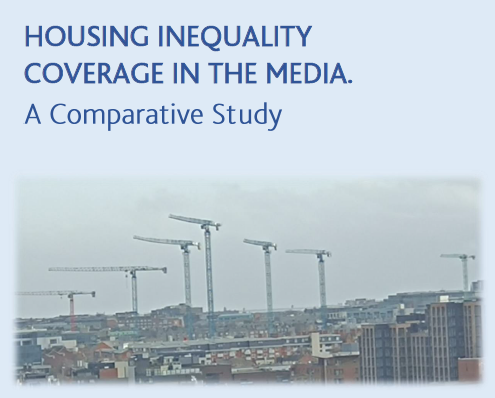The importance of ideology is fundamental in how the media treat the housing crisis, a new study finds.
The importance of ideology is fundamental in how the media treat the housing crisis, a new study finds.
Javier Díaz-Noci conducts two reports – one on inequality, the other on journalism history – during his research stay at University College Dublin (Ireland).
Javier Díaz-Noci has published two new reports on very different topics, as a result of his research stay at University College Dublin (Ireland), from 1 September 2024 to 29 February 2024, with a Salvador de Madariaga Grant for mobility (Ministry of Universities, PRX22_00561).
The first of those reports is titled Housing Inequality Coverage in the Media. A comparative study, co-authored with Prof Eugenia Siapera (UCD, Ireland) and Dr Javier Odriozola-Chéné (Universidade da Coruña), is based on an intensive content analysis of the news items on the housing crisis published in a wide array of representative digital media (both legacy and Internet-born) of Ireland and Spain during September to November 2023. At the end of the period, some riots in Dublin highlighted the importance of inequality in accessing a house in the discontent of part of the population and the emergence of far-right ideologies that instrumentalize it.
One of the findings of this research study is the importance of ideology in the treatment of the media -and their most active readers since a complementary analysis of comments was conducted of the housing crisis and economic inequality, linked to relevant social and political issues such as immigration and age. One of the main findings of this study -to be developed in the future- is that symptoms of the emergence of an antiliberal public sphere, sometimes conducted through digital platforms, some other times through digital-born media, since the far-right discourse reaches the mainstream, legacy media with much more difficulty. There is a subtle, but seemingly unstoppable shift towards an illiberal sphere linked to increasing inequalities, where far-winged ideas find their breeding ground.
Also, while there is no relationship between ideology and its connection to pre-distributive remedies, there is a relation between ideology, and redistributive solutions, and tax justice.
As a general conclusion, the media pay little or no attention to pre-distributive solutions to inequality and to the housing crisis, which is consistent with the finding by Thomas Piketty and his team, which ‘suggest that policy discussions on inequality should pay more attention to policies affecting pre-tax inequality and should not focus exclusively on redistribution’ (Piketty, T., Guillot, M., Garbinti, B., Goupille-Lebret, J. & Bozio, A. (2020, 18 November). Pre-distribution versus redistribution: Evidence from France and the US. Vox.eu).
The second research study, also of comparative nature, is related to Early Modern journalism history, and focuses on the emergence of newspapers during the rebellions of Ireland, Portugal, and Catalonia, that started around 1640.

